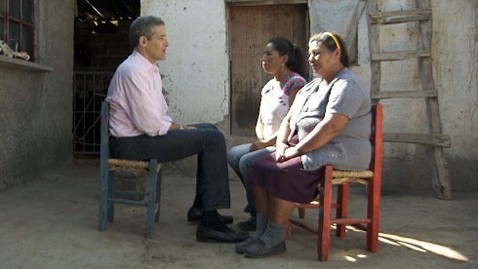'Esperanza': Mexico's Future

ABC News' Dr. Richard Besser interviews Guadalupe Garcia and her mother Guadalupe Alvarez in the tiny village of San Juan Coahmulco. Garcia is a reproductive health educator there, and the first in her family to attend college.
REPORTER'S NOTEBOOK
By DR. RICHARD BESSER
Esperanza
Esperanza- It means hope in Spanish. Fifteen years ago when I was living in San Diego, I worked every month in Tijuana, Mexico as a pediatrician in a little clinic run by the Catholic Church on the edge of a massive garbage dump. The clinic was called "Esperanza." For the families in that community, most of whom worked by combing through the trash for anything of value, the clinic offered just a hint of hope and a sense that someone cared.
I was teaching pediatrics at the University of California, San Diego, and brought pediatricians-in-training with me so that they could experience the two very different worlds existing less than 10 miles from each other: the affluence of San Diego and the abject poverty of a marginalized community in Tijuana. While we provided service to those in need, we really took away more than we gave: a broader sense of the world, an understanding of how easy it is to save a life, and for some, an expanded sense of social justice.
This year, due in part to a generous grant from the Bill and Melinda Gates Foundation, I have been traveling the globe reporting on health issues primarily in marginalized communities: lack of safe water in the slums of Bangladesh, polio in rural India, and babies dying from pneumonia in Nairobi, Kenya, to name just three. In each of these communities, I met incredible people who offered a little bit of esperanza in their own unique ways.
Guadalupe Garcia is one of those global heroes. At 27, she is the first in her family to attend college and the first to break with the traditional occupation of baking bread. She works in the small indigenous community San Juan Coahmulco, teaching women about reproductive health and reproductive rights; basically, how to have control over when, if ever, to have children. I spoke with Guadalupe and her mother Guadalupe Alvarez, about the differences in their lives. Differences driven by education.
"When I raised my kids, there wasn't any of that - family planning," said Alvarez. "I had six children and maybe I could have had more, but because I got sick, I couldn't have any more. But here, some women have had a dozen children."
In the early 1970's Mexico had a skyrocketing population that was doubling every twenty years. Worried about how they could possibly care for a population so large, the government undertook a dramatic effort to get the population under control. They promoted contraception, provided sex education, and launched an aggressive campaign to reduce family size. This is remarkable given that Mexico is predominantly Catholic. The results have been astonishing; family size has fallen from more than six children per family down to 2.2.
But in a way, there are two Mexicos. There's the urban Mexico of large cities, like Mexico City and others - that are liberal, with highly educated populations and where reproductive health services have been widely available. The other Mexico, the Mexico of rural villages inhabited by indigenous people, has seen much smaller declines. There are many reasons for this: lower literacy rates, more traditional and less autonomous roles for women, and a culture that bestows status on families with more children.
It is the work of women like the younger Guadalupe who will make the difference in Mexico. Women who are overcoming obstacles, getting education, and bringing change to rural Mexico. Helping women to understand that their bodies are their own. That they, in fact, do have rights.
After I interviewed the two Guadalupes, the elder Guadalupe prepared some incredible handmade blue corn tortillas for me and we ate in the courtyard of the family home in the tiny pueblo of San Juan Coahmulco. In the younger Guadalupe's eyes, I saw determination. As she looked at her mother, she conveyed love and respect as well as a commitment to make sure that the lives of the next generation are a little bit easier.